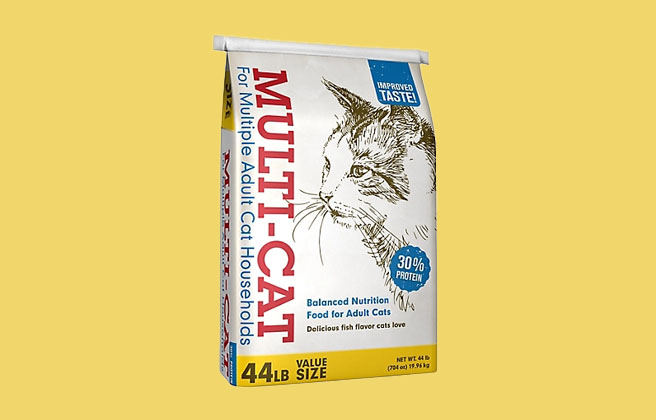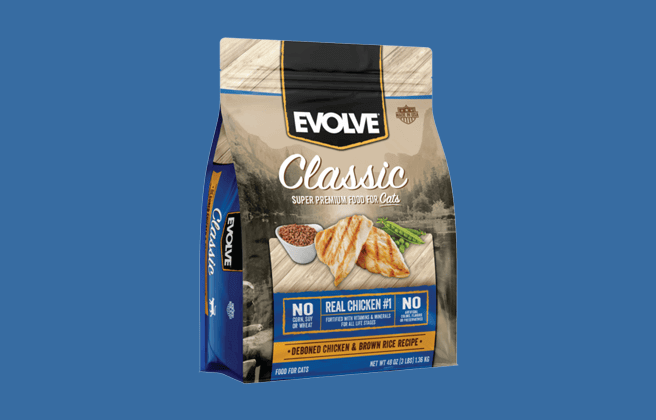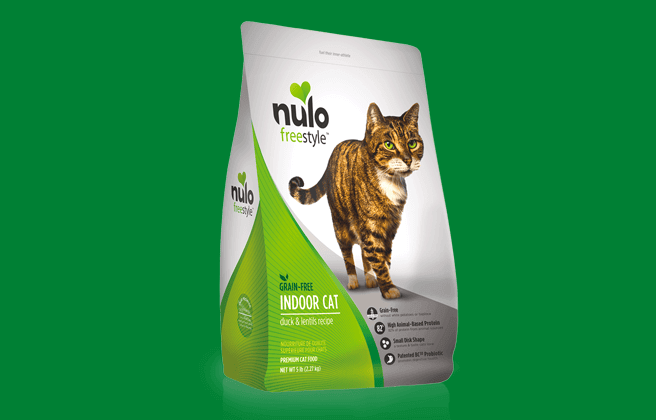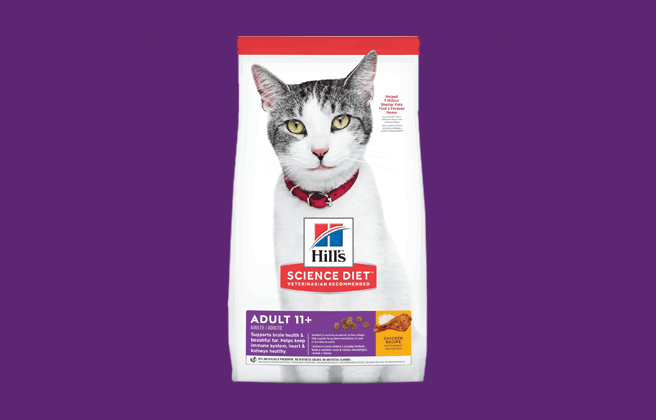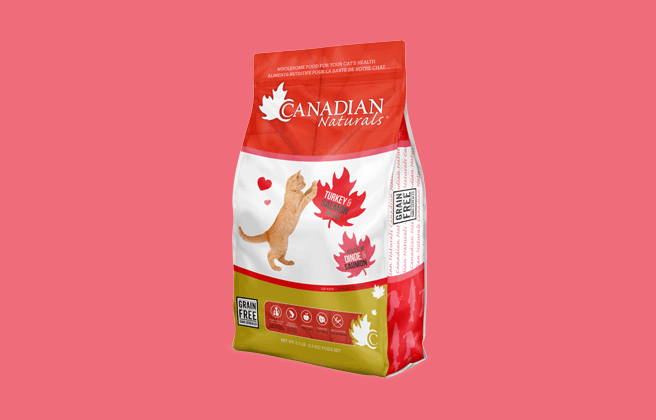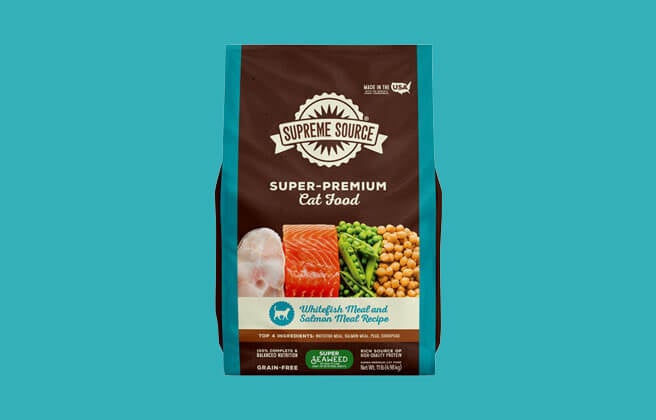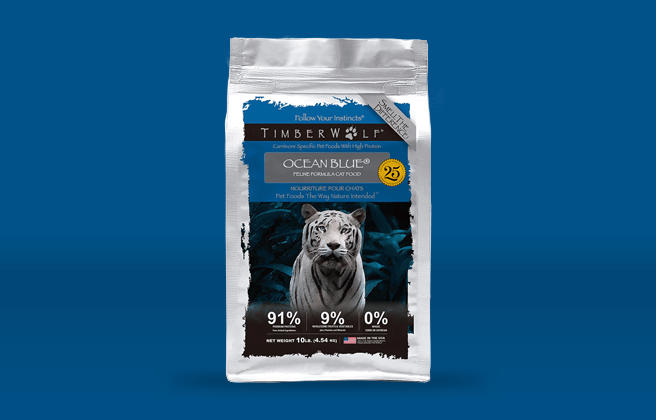
Our Verdict
Timberwolf dry product range is made of four recipes which all receive the Cat Food Advisor rating, 4.5 stars.
These grain-free recipes provide a rich source of species-appropriate animal protein, supplemented with vitamins and minerals. They are rich in taurine, an essential amino acid to support a cat’s vision and heart health.
Pros
- Contains animal protein
- High in protein content
- Low in carbohydrate
- Added vitamins and minerals
Cons
- Contains plant-based protein
- Includes some starchy ingredients
The table below shows each recipe in the range including our rating and the AAFCO nutrient profile: Growth (kitten), Maintenance (adult), All Life Stages, Supplemental or Unspecified.
| Product line | Rating | AAFCO |
|---|---|---|
| Timberwolf Wild & Natural® Feline Legends | 4.5 | A |
| Timberwolf Ocean Blue® Feline Legends | 4.5 | A |
| Timberwolf Dakota Feline Legends | 4.5 | A |
| Timberwolf Serengeti® Feline Legends | 4.5 | A |
Recipe and Label Analysis
Ocean Blue® Feline Legends was selected to represent the other products in the line for a detailed recipe and nutrient analysis.
Label and nutrient data below are calculated using dry matter basis.
Ocean Blue® Feline Legends recipe
Estimated Dry Matter Nutrient Content
Protein
Fat
CarbsCarbohydrates
Salmon, salmon meal, herring meal, pea protein, canola oil (preserved with mixed tocopherols), whitefish meal, egg albumin, tapioca starch, dried peas, dried potatoes, natural flavor, salt, potassium chloride, dl-methionine, choline chloride, taurine, l-tryptophan, inulin, dried spinach, dried apples, dried blueberries, dried carrots, dried cranberries, dried pumpkin, minerals (zinc methionine complex, zinc sulfate, iron proteinate, ferrous sulfate, copper proteinate, copper sulfate, manganese proteinate, sodium selenite, manganous oxide, calcium iodate), vitamins (vitamin E supplement, niacin supplement, vitamin A supplement, thiamine mononitrate, D-calcium pantothenate, pyridoxine hydrochloride, riboflavin supplement, vitamin D3 supplement, biotin, folic acid, vitamin B12 supplement), citric acid, mixed tocopherols, rosemary extract.
Fiber (estimated dry matter content) = 4%
Red denotes any controversial items
Ingredients Analysis
The first ingredient is salmon. Salmon is an oily marine and freshwater fish not only high in protein but also omega-3 fatty acids, essential oils needed by every cat to sustain life.
The second and third ingredients are salmon meal and herring meal. Because it is considered a meat concentrate, fish meal contains almost 300% more protein than fresh fish itself.
Fish meal is typically obtained from the “clean, dried, ground tissue of undecomposed whole fish and fish cuttings” of commercial fish operations. 1
The fourth ingredient is pea protein, what remains of a pea after removing the starchy part of the vegetable.
Even though it contains over 80% protein, this ingredient would be expected to have a lower biological value than meat.
And less costly plant-based products like this can notably boost the total protein reported on the label — a factor that must be considered when judging the meat content of this cat food.
The fifth ingredient is canola oil. Unfortunately, canola can be a controversial item. That’s because it can sometimes (but not always) be derived from genetically modified rapeseed.
Yet others cite the fact that canola oil can be a significant source of omega-3 fatty acids.
In any case, plant-based oils like canola are less biologically available to a cat than fish oil as a source of quality omega-3 fats.
The sixth ingredient is whitefish meal, a marine or freshwater species native to Canada and the California coast.
The seventh ingredient is egg albumin. Eggs are highly digestible and an excellent source of usable protein.
The eighth ingredient is tapioca starch, a gluten-free, starchy carbohydrate extract made from the root of the cassava plant.
From here the list goes on to include a number of other items. But to be realistic, ingredients located this far down the list (other than nutritional supplements) are not likely to affect the overall rating of the product.
However, this recipe contains chelated minerals that have been chemically attached to protein. This makes them easier to absorb. Chelated minerals are usually found in better cat foods.
Recipe star rating 4.5
Nutrient Analysis
Based on its ingredients alone, Ocean Blue® Feline Legends recipe looks like an above-average dry product.
The dashboard displays a dry matter protein reading of 55.6%, a fat level of 17.8% and an estimated carbohydrate level of 18.7%.
As a group, the brand features an above-average protein content of 50% and an above-average fat level of 18.9%. Together these figures suggest a carbohydrate content of 23.1% for the overall product line, alongside a fat to protein ratio of 39%.
This means Timberwolf contains higher than average protein, lower than average carbohydrate and higher than average fat, when compared to typical dry cat food.
Final Word
Timberwolf dry cat food is more expensive than many other cat foods, but it is good quality. Protein content is very high and the first ingredient in each recipe is animal protein. There are a number of starchy ingredients such as dried peas and dried potatoes, but overall, this food is good quality.
Recommended.
Has Timberwolf cat food been recalled in the past?
No, Timberwolf has never had a cat food recalled. However, in 2008 it did voluntarily recall two dog food products due to customer complaints that their dogs had become sick after eating them. There was no cause determined.
You can view a complete list of all cat food recalls since 2021 here.
To stay on top of any cat food product recalls, sign up for our free email alerts, here.
About
Founded in 2000, Timberwolf is an independently owned, family-operated pet food company.
Timberwolf is based in Windermere, Florida, and it was once produced by Diamond Pet Foods under the name Timberwolf Organics.
Every farmer, ranger, fisherman and producer must supply ingredients and products that meet or exceed Timberwolf’s strict health, safety and quality assurance standards, as well as be federally inspected and USDA/FDA approved.
Best cat foods
We uphold the highest editorial standards when creating the authoritative content pet parents rely on and trust.
Every piece of clinical content on the Cat Food Advisor is reviewed by our certified Veterinary Advisory Board, which consists of licensed veterinarians and medically certified specialists.
Our reviews are completely independent; we are not paid by any pet food company to promote their products favorably. We do not accept money, gifts, samples or other incentives in exchange for special consideration. For more information see our Disclaimer & Disclosure page.






